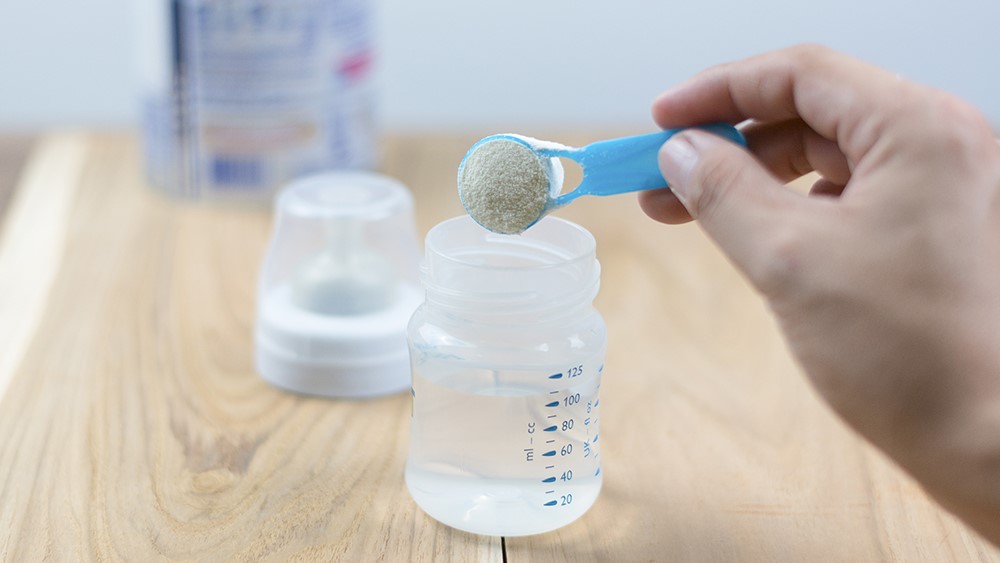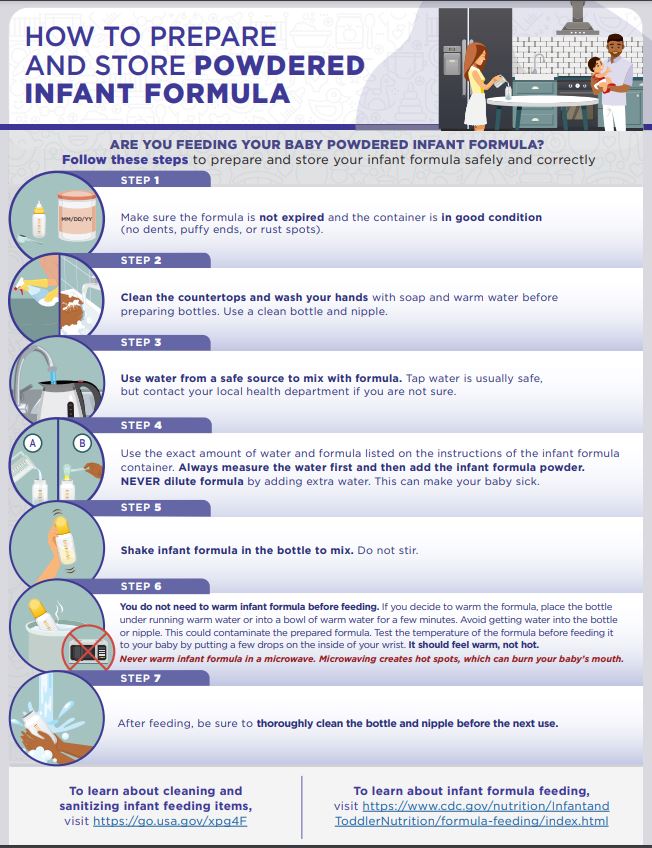At a glance
Carefully read and follow the instructions when preparing powdered infant formula. Extra precautions are needed for some infants and during emergencies.

Preparation
Ensuring cleanliness and preparing your infant's powdered formula according to the instructions are important. Follow these steps.
Wash your hands well before preparing bottles or feeding your baby. Clean and sanitize the workspace where you will prepare the infant formula.
Infant formula does not need to be warmed before feeding.
- If you prefer to warm your baby's bottle, never use a microwave. Microwaves heat milk and food unevenly, resulting in hot spots that can burn your baby's mouth and throat.
- If you choose to warm your baby's bottle, place the bottle under running warm water. Keep water out of the bottle and off the nipple. Before feeding, put a couple drops of infant formula on the back of your hand to see if it is too hot.
If you use powdered infant formula, use water from a safe source to mix your infant formula. If you are not sure if your tap water is safe, contact your local health department.
Use the amount of water listed on the instructions of the infant formula container. Always measure the water first and then add the powder.
- Too much water may mean the formula would not meet the nutritional needs of your baby.
- Too little water may cause your baby's kidneys and digestive system to work too hard. This can make your baby dehydrated.

Download and print a handout on how to prepare and store powdered infant formula in English and Spanish.
Use quickly or store safely
Prepared infant formula can spoil if it is left out at room temperature. To prevent spoiling, use prepared infant formula within 2 hours of preparation and within one hour from when feeding begins. If you do not start to use the prepared infant formula within 2 hours, immediately store the bottle in the fridge and use it within 24 hours.
Throw out any infant formula that is left in the bottle after feeding your baby. The combination of infant formula and your baby's saliva can cause bacteria to grow. Be sure to clean and sanitize the bottle before its next use.
Store unopened infant formula containers in a cool, dry, indoor place—not in vehicles, garages, or outdoors.
Once a container of powdered infant formula is opened, store in a cool, dry place with the lid tightly closed. Do not store it in the refrigerator.
Most infant formulas need to be used within 1 month of opening the container. Confirm this by checking the label. When you open the container, write the date on the lid to help you remember.
Never use formula after the "Use By" date on the container.
Different recommendations for preparing powdered formula
When preparing powdered infant formula, it is important to know that recommendations can differ based on several factors including your baby’s age and the safety of the water. This information can help you choose the safest option.
Most of the time, it's safe to prepare powdered infant formula by mixing it with tap water and following the manufacturer's instructions on the container. The water can be filtered or unfiltered. See how to prepare and store powdered infant formula.
Extra precautions for some infants
Take extra steps when preparing infant formula for babies who:
- Are younger than 2 months old.
- Were born prematurely, meaning before 37 weeks of pregnancy.
- Have a weakened immune system.
These babies could get very sick if they drink formula contaminated with bacteria, such as Cronobacter. These bacteria can live in the environment or in dry foods such as powdered infant formula. Cronobacter infections are rare but serious in infants.
To kill germs like Cronobacter in powdered infant formula, the formula must be mixed with very hot water. Boil the water and then wait about five minutes before mixing with powdered infant formula. After mixing, the formula will still be too hot to feed your baby, so it's important to wait for the formula to cool first so you don't burn your baby's mouth. You can test the temperature with a few drops on your wrist. It should feel warm, not hot.
Learn about how you can protect your baby from Cronobacter infection when preparing powdered infant formula.
Extra steps in an emergency
When there is an emergency such as a water main break, hurricane, or flood, tap water may not be available or safe to mix with powdered infant formula.
If you believe the tap water is unsafe, use bottled water to prepare formula until local authorities say the tap water is safe to drink. If tap water is your only option, make it safe by boiling or disinfecting it. If you choose to boil your water, let the water cool to room temperature before mixing it with powdered infant formula. Always test the temperature before feeding your baby by putting a few drops of formula on your wrist so you do not burn your baby's mouth. It should feel warm, not hot.
CDC provides step-by-step instructions on how to prepare and store powdered infant formula during emergencies and how to clean infant feeding items, such as bottles and nipples, during emergencies.
If there is an emergency AND your baby is younger than 2 months old, born prematurely, or has a weakened immune system, follow the extra precautions above for preventing Cronobacter.
Chemicals in water
| Recommendations for Preparing Powdered Infant Formula | |||
|---|---|---|---|
| Feeding Context | Recommended Preparation Method | Why? | Step-by-Step Instructions |
| Most babies, most of the time | Follow the manufacturer's instructions. | When tap water is safe to use, it can be mixed with powdered infant formula. | |
| Babies who are younger than 2 months old, born prematurely, or have a weakened immune system |
|
|
|
| During or after an emergency when the water is not safe to use* *If there is an emergency AND your baby is younger than 2 months old, born prematurely, or has a weakened immune system, follow the instructions above for preventing Cronobacter. |
|
|
|





